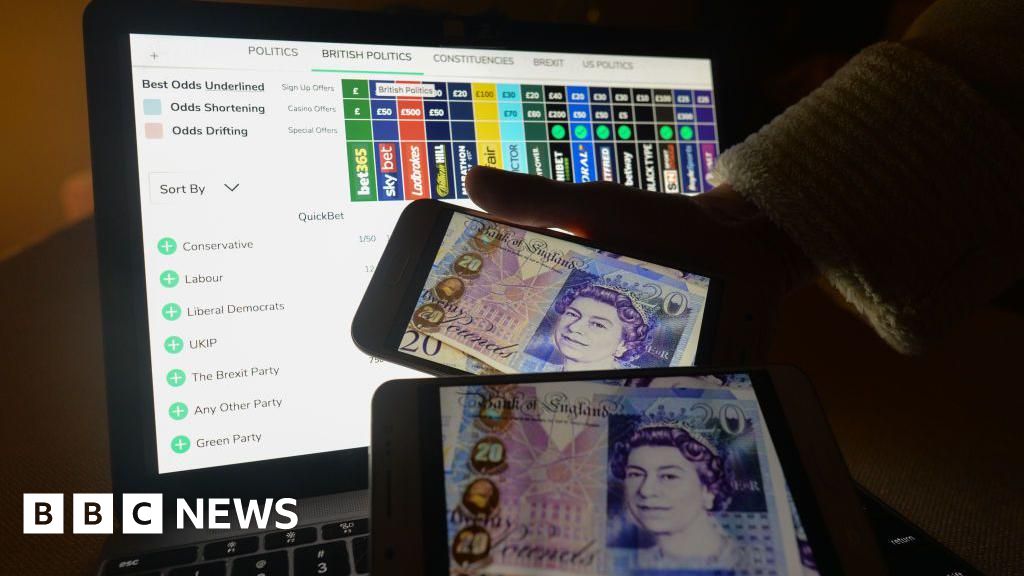Met Police join Gambling Commission inquiry into election bets

Police are to take the lead in investigations into some of the allegations about bets placed by politicians on the general election.
Industry regulator the Gambling Commission will continue to lead inquiries into cases “where the alleged offending is limited to breaches of the Gambling Act only”, a Metropolitan Police spokesperson told the BBC.
But detectives would be in charge of “a small number of cases” where other offences might also be involved, such as misconduct in public office, the spokesperson added.
On Tuesday, the Conservatives withdrew their support from two of their election candidates under investigation. Labour suspended one of its candidates who is also being investigated, after allegedly betting he would lose his constituency battle.
The BBC’s head-to-head TV debate kicked off with the two leaders being questioned about the claims.
Sir Keir Starmer accused Prime Minister Rishi Sunak of having to be “bullied” into taking action. Mr Sunak said he had handled the affair properly.
The first audience question in the debate asked how the leaders would restore trust in politics, with people “dismayed by the lack of integrity and honesty”.
Sir Keir said that “when one of my team was alleged to have been involved and investigated by the Gambling Commission, they were suspended within minutes, because I knew it made it really important to be swift”.
“The prime minister delayed and delayed and delayed until eventually he was bullied into taking action,” the Labour leader added.
Mr Sunak responded: “It was important to me that given the seriousness and the sensitivity of the matters at hand that they were dealt with properly, and that’s what I’ve done.”
The prime minister repeated that he was “frustrated” and “furious” about what had happened.
Earlier, Liberal Democrat leader Sir Ed Davey called for a review of betting laws, following recent reports.
He said he had bet on the outcome of previous elections, but drew a distinction between what he described as “having a flutter” and having inside knowledge before placing bets.
On Tuesday, after days of questions, the Tories withdrew support for two election candidates – Laura Saunders in Bristol North West and Craig Williams in Montgomeryshire and Glyndwr.
Russell George, a Conservative politician in the Welsh Parliament, is also facing inquiries by the regulator and has “stepped back” from his frontbench role.
Labour has suspended its candidate in Central Suffolk and North Ipswich, Kevin Craig.
All three parliamentary candidates will continue to appear on ballot papers, but if any of them is elected, they would sit in the Commons as an independent MP.
BBC Newsnight understands that as many as 15 Conservative Party candidates and officials are being scrutinised by the commission.
Separately, Scottish Secretary Alister Jack is not being looked into by the commission, but has admitted placing three bets on the election date.
Mr Jack, who is not standing to be an MP in the 4 July election, told the BBC that in April he placed a successful bet that the election date would fall between July and September – after losing two similar bets in March.
He said his wagers, which included two unsuccessful £5 bets and one successful £20 bet, did not breach any rules.
Asked about Mr Jack’s case, Mr Stride told BBC Radio 4’s Today programme his colleague had been “very clear” that he “hasn’t broken any of the rules or used any inside information”.
He said there needed to be a “thoughtful debate” on the general subject adding that there was “a huge difference between a politician placing a bet on what government we’ll have in 10 years’ time and someone who does something that’s more immediate – or relates for example to their own seat”.
The minister argued the focus should be on rule-breaking and that there should be “very severe consequences” if people were found to have committed wrongdoing.
Sir Ed told the BBC he had placed a bet on how well his party would do in the 2010 election, but lost.
He also told ITV he had bet on the 2022 by-election in North Shropshire, which his party won.
“But I think lots of people in politics do this. One reason why we need this review of gambling regulations is to get real clarity on what is allowed but what isn’t,” he said.
Related
Best Crypto Casinos UK – Top 10 Bitcoin Gambling Sites…
Despite its overwhelming popularity, crypto gambling in the UK remains in a legal gray area. All casino operators in the UK need to have a valid permit, as requ
Online gambling channelisation in the UK – How well it…
Gambling in the UK is controlled under the Gambling Act 2005. This act requires all gambling operators to be licensed and regulated by the UK Gambling Commis
UK Gambling Commission Opens White Paper Public Feedback | Suffolk…
The UK Gambling Commission (UKGC) has initiated its third consultation period to gain feedback and proposals to make gambling machines in the UK more secure a
Paddy Power High Court case: Gardener wins £1m payout
Mrs Durber sued PPB Entertainment Limited, which trades as Paddy Power and Betfair, for breach of contract and for the rest of her winnings, based on what she w












